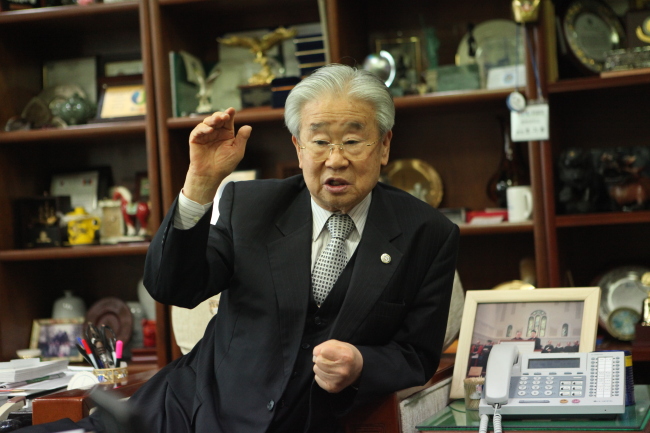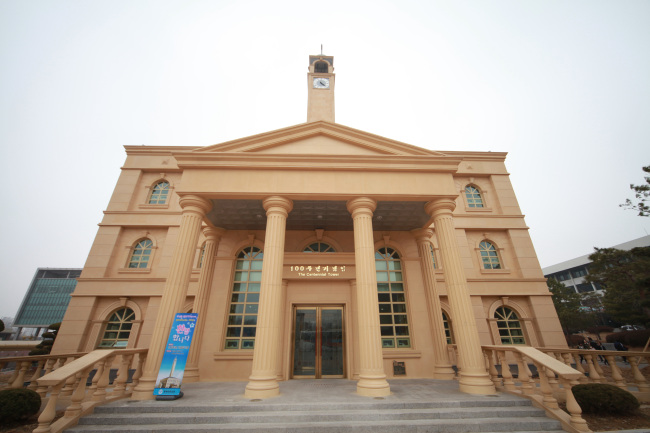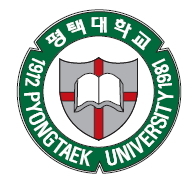On a cold winter day in 1910, American pastor Arthur T. Pierson arrived in Korea, the land of the morning calm. Touched by the people who walked for days to hear his preaching, he decided to set up a Bible school. But he grew ill and had to return to his homeland, where he died only months later.
Before his death in 1911, Pierson left a will to his family and friends to build a college in Korea. His mission has been passed down through the generations at the school that is now called Pyeongtaek University.
“Our school was built on the foundation laid by his successors,” Cho Ki-hung, the president of Pyeongtaek University, told The Korea Herald in a recent interview.
The school strives to embody Pierson’s wish to bring “educational excellence in the spirit of Christianity,” he said.
The school was first founded as the Pierson Memorial Bible School in 1912 in Seoul. It was renamed the Pierson Memorial Bible Seminary in 1968 and moved to Pyeongtaek, Gyeonggi Province, in 1981. After transforming into a full-scale university, the school adopted the current name in 1996.

Cho Ki-hung, president of Pyeongtaek University (Pyeongtaek University)
Cho, 81, is witness to the history of Pyeongtaek University as it has nurtured numerous Christian leaders in Korea. He graduated from the seminary in 1962 and devoted his whole life to its development as a teacher and administrator. He became a secretary of the school’s foundation in 1969 and the inaugural president of newly named Pyeongtaek University in 1996.
Under his leadership, the school’s mission has gone beyond religion and now incorporates a series of multicultural education and welfare programs.
Since 2006, the school has run the Head Start Program to help newly deployed U.S. troops smoothly adapt to Korea. The weeklong session offers courses in Korean language, history, politics and culture.
Cho noted that the program has been popular, attracting more than 9,100 participants so far. The number is expected to grow as Pyeongtaek will become the main hub of U.S. Forces Korea with its relocation project scheduled to be completed by 2016.
The university also seeks to be an education hub for multiethnic children in the country, Cho noted. Since 2006 the departments of social welfare and youth welfare have been organizing language and other classes to help them adjust to Korean society.
In addition around 20 students from China and other developing countries in Asia receive scholarships to study theology at the school each year.
The school aims to train future leaders who can contribute to the development of churches and world peace, following the footsteps of Rev. Pierson.
Its commitment to the founding spirit has never wavered despite ordeals the school faced, especially during the 1960s-1970s before it moved to its current location in Pyeongtaek.
In the late 1970s, during the country’s rapid industrialization under the military rule of Park Chung-hee, many schools that were not formally registered under the administration were merged or closed.
“Our school had never registered in any official way until then,” Cho recalled. The Pierson Bible Seminary was forced to close down in 1979.
To decentralize the capital, the military administration also banned construction of new campuses in Seoul as well as suburban areas.
“I searched for a location to reopen the school at a new campus. I traveled around the country and finally found a huge field,” Cho said.
Although he later found out that the land used to be a public cemetery, it didn’t matter. “As a Christian, I wasn’t superstitious. Plus ancestors traditionally build graveyards in good locations so it was no problem,” he recalled.
In 1981, the school was given government approval to run a college and made a fresh start on more than 125,000 square meters of land in Pyeongtaek.
It started with fewer than 120 students in 1981 and today serves some 4,700 students through six academic divisions and seven departments, with subjects including theology, languages, communications and computer sciences.
“Our goal is not to become a huge university, but to provide genuine character education,” Cho said.
Every student must attend the weekly chapel, “the heart of the school,” as he puts it. It is not only for religious service, but for character development of students, he said.
Alcohol and smoking are also prohibited at the university as articulated in its admission guidelines. The school also hires only nonsmoking faculty and staff.
“It is all part of our education of character development,” he said.
The global environment is changing and competition among universities is growing. The challenges would not weaken its devotion to nurture ethical leaders who can contribute to national development, Cho said.
“I want to devote the rest of my life to continuing Rev. Pierson’s mission to provide better education to this country,” he added.
By Oh Kyu-wook (
596story@heraldcorp.com)








